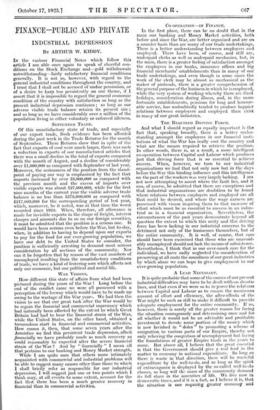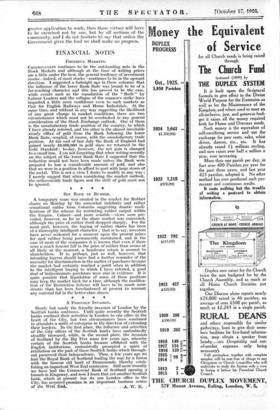FINANCE PUBLIC AND PRIVATE
INDUSTRIAL DEPRESSION
BY ARTHUR W. KIDDY.
IN the various Financial Notes which follow this article I am able once again to speak of cheerful con- ditions on the Stock Exchange and—gold withdrawals notwithstanding—fairly satisfactory financial conditions generally. It is not so, however, with regard to the general industrial conditions throughout the country, and I trust that I shall not be accused of undue pessimism, or of a desire to harp too persistently on one theme, if I assert that it is impossible to regard the general economic condition of the country with satisfaction so long as the present industrial depression continues ; so long as our adverse visible trade balance retains its present size ; and so long as we have considerably over a million of the population living in either voluntary or enforced idleness.
SEPTEMBER TRADE.
Of this unsatisfactory state of trade,' and especially of our export trade, fresh evidence has been afforded during the past week in the Trade Returns for the month of September. These Returns show that in spite of the fact that exports of coal were much larger, there was such a reduction in exports of our manufactured articles that there was a small decline in the total of exports compared with the month of August, and a decline of considerably over £1,000,000 as compared with September of last year. Moreover, the seriousness of the position from the stand- point of paying our way is emphasized by the fact that imports increased by over £6,000,000 as compared with the previous month and the excess of imports over visible exports was about £27,000,000, while for the first nine months of the current year the visible adverse trade balance is no less than £273,000,000 as compared with £217,000,000 for the corresponding period of last year, which, moreover, be it noted, was at that time the worst recorded since 1920. When, therefore, all allowance is made for invisible exports in the shape of freight, interest charges and amounts due to us on our foreign securities, it must be admitted that the position is a serious one. It would have been serious even before the War, but to-day, when, in addition to having to depend upon our exports to pay for the food for our ever-growing population, we have our debt to the United States to consider, the position is sufficiently arresting to demand most serious con.sideration by all sections of the community. Nor can it be forgotten that by reason of the vast numbers of unemployed resulting from the unsatisfactory conditions of trade,- we have a kind of festering sore which affects not only our economic, but our political and social life.
WAR VISIONS.
How different this state of affairs from what had been pictured during the years of the War I Long before the end of the conflict came we were all possessed with a perception of the leeway which would have to be made up owing to the wastage of the War years. We had then the vision to see that our great task after the War would be to regain the financial and commercial supremacy which had naturally been affected by the extent to which Great Britain had had to bear the fmancial strain of the War, while the United States, on the other hand, obtained a tremendous start in financial and commercial activities. How comes it, then, that some seven years after the Armistice we find this persistent trade depression, albeit financially we have probably made as much recovery as could reasonably be expected after the severe financial strain of the War ? And by " financially " I mean all that pertains to our banking and Money Market strength. While I am quite sure that others more intimately acquainted with commercial and industrial problems will be able to suggest many causes other than those to which I shall briefly refer as responsible for our industrial depression, I will suggest just one or two points which I think may, at all events to some extent, account for the fact that there has been a much greater recovery in financial than in commercial activities. CO-OPERATION—IN FINANCE.
In the first place, there can be no doubt that in the main our banking and Money Market activities, both before and since the War, are better- organized and are on a sounder basis than are many of our trade undertakings. There is a better understanding between employers and employed. There have been, of course, and still are, underpaid clerks as well as underpaid mechanics, but, in the main, there is a greater feeling of satisfaction amongst the employees in our banks, insurance offices and big financial merchants' establishments than in many of our trade undertakings, and even though in some cases the work of the clerk may be almost as mechanical as the maker of pinheads, there is a greater comprehension of thegeneral purpose of the business in which he is employed, while the very system of working whereby there are fixed holidays, consideration during illness, and, in the more fortunate establishments, pensions for long and honour- able service, has undoubtedly tended to produce happier relations between employers and employed than exist m many of our great industries.
THE REQUIRED DRIVING FORCE.
And what I should regard as equally important is the fact that, speaking broadly, there is a better under- standing amongst the employees in our financial insti- tutions of what the War has really cost the country and what are the means required to retrieve the position. In other words, there is, as a result, a more intelligent co-operation between Capital and Labour which produces just that driving force that is so essential to achieve success. When, however, we turn to our industrial organizations we find that not only now but in the days before the War this binding influence and this intelligence on the part of the workers was very largely lacking. I am not now attempting to assert where the fault lies, and it can, of course, be admitted that there are exceptions and that industrial organizations are doubtless to be found where relations between employers and employed are all that could be desired, and where the wage earners are possessed with vision inspiring them to that measure of effort which must be as essential to success in an indus- trial as in a financial organization. Nevertheless, the circumstances of the past years demonstrate beyond all question the extent to which this unity and this driving force has been lacking in our industrial concerns to the detriment not only of the businesses themselves, but of the entire community. It is well, of course, that care should have been exercised that those who arc unavoid- ably unemployed should not lack the means of subsistence. Nevertheless, I think that in our over-much care for the individual, we have sadly neglected the consideration of preserving at all costs the soundness of our great industries by which alone we can hope to give employment to our ever-growing population.
A LEAD NECESSARY.
It is quite probable that some of the causes of our present industrial difficulties may have to be dealt with on drastic lines, and that even if we were so to in-prove the relations between Capital and Labour as to ensure the maximum amount of effort and efficiency, the after-effects of the War might be such as still to make it difficult to provide adequate employment for the entire community. If so, however, there is surely all the greater reason for facing the situation courageously and determining once and for all whether it would not be an advisable and profitable investment to devote some portion of the money which is now lavished in " doles' to promoting a scheme of emigration to various parts of our Empire, thereby not only relieving the congestion of unemployment but laying the foundations of greater Empire trade in the years to come. But above all, I believe that the great essential is that the Government should give a real lead in the matter to economy in national expenditure. So long as there is waste in that direction, there will be wasteful expenditure by the well-to-do, and so long as the spirit of extravagance is displayed by the so-called well-to-do classes, so long will the mass of the community demand its full share in the amenities of life. We live now in democratic times, and if it is a fact, as I believe it is, that the situation is one requiri'g greater economy and greater. application. to work, then those virtues will have to be exercised not by one, but by all sections of the community, and I do not hesitate to say that unless the Government gives the lead we shall make no progress.



















































 Previous page
Previous page